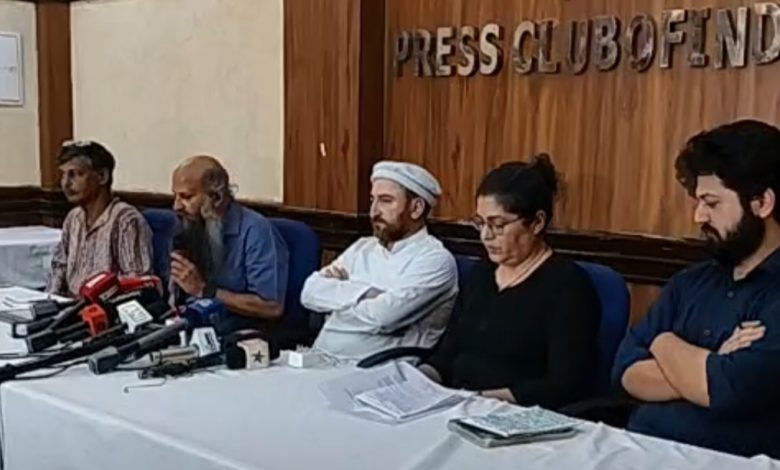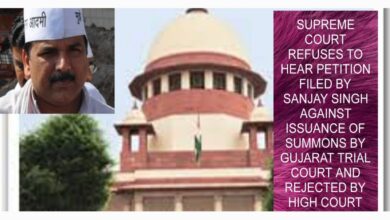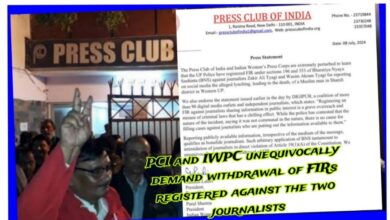People for Himalaya Extends Solidarity with Ladakh Movement; Calls for Urgent Action on disaster prevention in the Himalayan Region

New Delhi, 29 September 2025
People for Himalaya, a collective campaign for climate and disaster justice across the mountain states, held a press conference in the national capital today. The campaign strongly condemned the arrest of renowned environmental activist Sonam Wangchuk under the draconian National Security Act (NSA) and called for his immediate release. Terming the arrest as an assault on democratic rights and freedom of dissent, the campaign asserted that such acts were a blatant attempt to silence the voices of the people of Ladakh who have been raising legitimate concerns about their constitutional rights, livelihoods, and environment.
The campaign also condemned the violent attack on peaceful protestors in Leh, Ladakh on 24 September 2025, where four people were killed and over 80 injured of which 15 are critical. People for Himalaya described the use of excessive force by opening of fire as an act of brutality against unarmed citizens and demanded accountability at the highest level. Specifically, the campaign called for a high-level judicial inquiry into the violence, the resignation of the Lieutenant Governor and Director General of Police of Ladakh, the immediate release of Sonam Wangchuk and all arrested leaders, and the withdrawal of all charges. It reiterated full support for the four-point agenda of the people of Ladakh, led by the Leh Apex Body and the Kargil Democratic Alliance, which includes the demand for statehood and Sixth Schedule protection.
Crisis of development and governance in the wake of climate disasters
The campaign drew attention to the larger crisis unfolding across the Himalayan region, linking the situation in Ladakh to widespread environmental and social vulnerabilities. The monsoons of 2025 once again laid bare the vulnerability of the mountains, with devastating floods and landslides reported from Uttarkashi, Mandi, Kishtwar, Joshimath, Dharali, Siang, Ladakh, and Sikkim. The campaign stressed that these events cannot be dismissed as only as natural and climate disasters. Rather, they represent the compounded impact of climate change interacting with poor governance and policy making centred on reckless models of extractive development leading in the form of rapid and massive commercial tourism, unregulated infrastructure expansion, and deforestation.
For over a decade, scientists, civil society groups, and communities have been warning about the intensifying effects of climate change in the Himalayas—ranging from erratic monsoons and extreme rainfall events to accelerated glacial melt. The campaign pointed out that governments and regulatory institutions have consistently failed to heed these warnings, instead continuing to prioritise short-sighted projects that increase risks rather than reduce them. The 2025 monsoons, the campaign emphasised, must serve as a wake-up call to governments across the region.
The press note highlighted that even the Supreme Court of India has had to take cognisance of the Himalayan ecological crisis, where it was recognised that unregulated development had aggravated the impacts of disasters. However, the blame and responsibility of these cannot be laid on the state governments of the mountains.
The dilution of environmental safeguards like environmental impact assessment (EIA) mechanisms and exemptions granted for projects such as four-lane highway expansions, railways, ropeways, and tunnels are the key factors. The Char Dham road project was cited as a stark example where such exemptions have overridden ecological concerns, worsened landslide risks, and endangered mountain communities in the name of development. The campaign asserted that this weakening of regulatory systems has played a direct role in intensifying the scale and frequency of disasters in the Himalayas.
Demands for Change
People for Himalaya stressed that the current development trajectory is unsustainable and that immediate corrective measures are needed to prevent further devastation. The campaign demanded a strengthened disaster response system, including fair rehabilitation under the Disaster Management Act (2005), guaranteed central government support in times of extreme events, and safe resettlement policies for communities impacted by floods and those in unsafe and vulnerable zones. Since large areas of mountain states are under legal category of forests special provisions should be made in the Forest Conservation Act 1980 to allow their rehabilitation.
It further demanded accountability in infrastructure projects, calling for strict enforcement of the Dam Safety Act (2022) across all Himalayan states, restructuring of key regulatory institutions such as the Central Water Commission, Pollution Control Boards, and State Disaster Authorities, and penal action against violators of safety and environmental norms.
The campaign also urged the government to stop destructive mega-projects such as large dams, railway corridors, and mega solar parks in fragile mountain zones, and to scrap the Forest Conservation Act (2023) amendments which exempt projects from forest clearance. Instead, it called for strengthening the 1994 EIA Notification, ensuring rigorous, transparent, and participatory assessments.
On governance, the campaign emphasised the need for decentralised decision-making, including just implementation of the Forest Rights Act (2006), and making the free, prior, and informed consent of Gram Sabhas mandatory for all developmental projects. It also demanded obligatory public disclosure of all hydrological, air, and water data, and hazard maps to support independent monitoring of climate mitigation efforts, particularly through participatory catchment area planning at the microlevel.
The campaign affirmed that it stands firmly with the people of Ladakh and with all Himalayan communities who are resisting ecological destruction and fighting to protect their ancestral lands, democratic rights, and futures.
Speakers:
1. Sajjad Kargili, Kargil Democratic Alliance, Ladakh
2. Atul Sati, Joshimath Bachao Sangharsh Samiti, Uttarakhand
3. Manshi Asher, Himdhara Collective
4. Anmol Ohri, Climate Front Jammu
The campaign was launched in 2024 after the disasters in Himachal, Joshimath, Sikkim to advocate for pan Himalayan awareness. And yesterday a consultative meeting of the campaign was held to decide to take forward the issues in the wake of the consecutive disasters and to express solidarity with the struggle in Ladakh.





